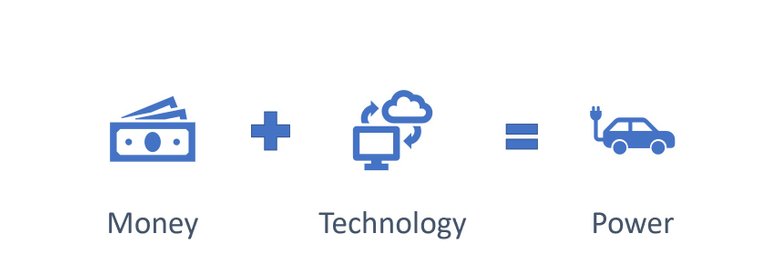Distributed Ledger Technologies (DLT) or Blockchain tech is the new frontier in the generation of money services that can deepen individual or personal power. The wide distribution of internet-connected smartphones has turned each of us into our own news publishers, ride-sharing service, and media producer (think, music, art, movies).
Money over Internet
Similarly, Blockchain connected services empower individuals to be their own bankers, money generators, money transmitters. In many ways, this is a hard concept to grasp. It is hard to comprehend how individuals can safely store their own money on a digital platform outside of a bank. It is also hard to imagine how every piece of digital content that an individual creates when posted to a Distributed Ledger Platform can generate income for one or more people.
 The New Model of Money, adpated from Matthew Roszak
The New Model of Money, adpated from Matthew Roszak
The other puzzling element is the way in which collaborative content creation and sharing outside of news can somehow become a "tradeable" transaction within itself. The old model of centralized monopolies that profit from social data is is already disrupted. To be sure, industries that profit from private information are unnecessary in this new tokenization model.
*How can educators or another professional learning benefit from this new approach to networked money technology? *
In this new model, money is not just tradable currency that is ported from work in the world. Nor is money exclusively generated offline and then ported online. In the tokenized model, the platform creates its own money via the network. It rewards the users, content creators, and platform managers for contributing to the platform. In effect, the software that is the platform, rewards the activity of the content creators and generates more value from the growing activity.
The Tokenization of Things
In this TED Talk, Matthew Roszak describes this phenomenon as "The Tokenization of Things." In the talk, Roszak describes how the old economy built on centralized/monopoly supplies of monetization is shifting to tokenization.
Communities that are built on the platform will generate rewards simply by the participation of community members. In a way, this means that there is an intrinsic and extrinsic reward for completing typical professional learning activities. **To read and post articles and new materials, produce both the learning reward as well as the monetary reward for spending the time to learn. **
Additionally, the community can construct financial goals and then use a participant pool to generate funds through content creation. For example, a group of teachers can plan a Professional Learning Trip for Summer study abroad. They could use a platform like Hive Blog to create content and donate all proceeds to a shared pool. That pool could then be drawn down to fund the summer learning travel. Similarly, this content creation could be used to purchase professional development books, resources, or equipment.
This tokenization can have real value for underresourced educational settings and enterprises. Thanks to @thomas04 for inspiring this line of thinking.
Rasbas,
If you are referring to my project idea, I am @thomasd04.